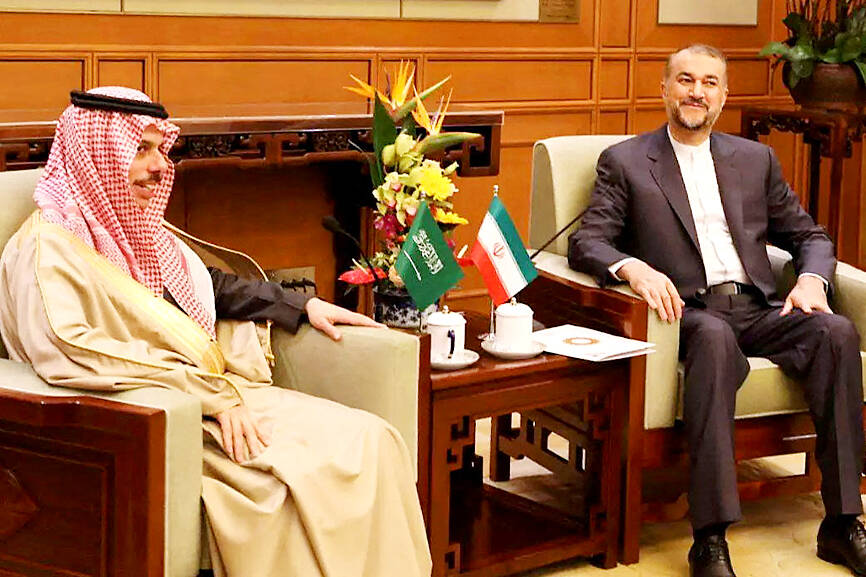A Saudi delegation arrived in Tehran on Saturday to discuss reopening the kingdom’s diplomatic missions in the Islamic republic, two days after a historic meeting in Beijing between their foreign ministers.
The visit follows the unprecedented meeting between their diplomatic heads in China on Thursday after they agreed last month to restore diplomatic ties.
The Saudi diplomatic delegation arrived in Iran to discuss the reopening of its missions after a seven-year absence, Riyadh’s Ministry of Foreign Affairs said.

Photo: AFP
Cited by the official Saudi Press Agency (SPA), the ministry called the visit part of “implementing the tripartite agreement” reached on March 10 between the two regional powers, brokered by China, to restore ties that were ruptured in 2016.
The two longtime Middle East rivals have now pledged to work together.
When Saudi Minister of Foreign Affairs Prince Faisal bin Farhan Al Saud and his Iranian counterpart Hossein Amir-Abdollahian met in Beijing on Thursday, they vowed to bring security and stability to the turbulent Gulf region.
“The two sides emphasised the importance of following up on the implementation of the Beijing Agreement and its activation in a way that expands mutual trust and the fields of cooperation and helps create security, stability and prosperity in the region,” a joint statement said.
A Saudi “technical delegation” on Saturday met Iranian chief of protocol Mehdi Honardoust at the ministry in Tehran, the SPA said.
The two countries severed ties after protesters in the Islamic republic attacked Saudi diplomatic missions following Riyadh’s execution of a prominent Shiite cleric.
The surprise rapprochement between mainly Sunni Muslim Saudi Arabia, the world’s largest oil exporter, and Shiite-majority Iran, strongly at odds with Western governments over its nuclear activities, has the potential to reshape relations across a region characterized by turbulence for decades.
Under last month’s agreement, the two countries are to reopen their embassies and missions within two months, and implement security and economic cooperation deals signed more than 20 years ago.
Iranian President Ebrahim Raisi has also been invited by Saudi King Salman to Riyadh, a trip planned to take place after the holy fasting month of Ramadan which ends later in this month.
Rabha Saif Allam, a specialist in Middle Eastern affairs at the Cairo Center for Strategic Studies, said there was “an acceleration” in the normalization of ties.
She said this means an intensification of meetings “at the economic and security levels,” adding that she believes normalization would be sealed by Raisi’s planned visit to Riyadh at the end of this month.
The US has for decades been a key diplomatic power in the Middle East and has an alliance, albeit a frequently strained one, with Saudi Arabia.
Washington has cautiously welcomed the rapprochement between the Saudis and Iran, despite the role of China, which it sees as its biggest global challenger.
Iran and Saudi Arabia vie for influence in Syria, Lebanon and Iraq.
They also support rival sides in several conflict zones across the region, including in Yemen, where Houthi rebels are backed by Tehran, and Riyadh leads a military coalition supporting the government.

Kehinde Sanni spends his days smoothing out dents and repainting scratched bumpers in a modest autobody shop in Lagos. He has never left Nigeria, yet he speaks glowingly of Burkina Faso military leader Ibrahim Traore. “Nigeria needs someone like Ibrahim Traore of Burkina Faso. He is doing well for his country,” Sanni said. His admiration is shaped by a steady stream of viral videos, memes and social media posts — many misleading or outright false — portraying Traore as a fearless reformer who defied Western powers and reclaimed his country’s dignity. The Burkinabe strongman swept into power following a coup in September 2022

TRUMP EFFECT: The win capped one of the most dramatic turnarounds in Canadian political history after the Conservatives had led the Liberals by more than 20 points Canadian Prime Minister Mark Carney yesterday pledged to win US President Donald Trump’s trade war after winning Canada’s election and leading his Liberal Party to another term in power. Following a campaign dominated by Trump’s tariffs and annexation threats, Carney promised to chart “a new path forward” in a world “fundamentally changed” by a US that is newly hostile to free trade. “We are over the shock of the American betrayal, but we should never forget the lessons,” said Carney, who led the central banks of Canada and the UK before entering politics earlier this year. “We will win this trade war and

‘FRAGMENTING’: British politics have for a long time been dominated by the Labor Party and the Tories, but polls suggest that Reform now poses a significant challenge Hard-right upstarts Reform UK snatched a parliamentary seat from British Prime Minister Keir Starmer’s Labor Party yesterday in local elections that dealt a blow to the UK’s two establishment parties. Reform, led by anti-immigrant firebrand Nigel Farage, won the by-election in Runcorn and Helsby in northwest England by just six votes, as it picked up gains in other localities, including one mayoralty. The group’s strong showing continues momentum it built up at last year’s general election and appears to confirm a trend that the UK is entering an era of multi-party politics. “For the movement, for the party it’s a very, very big

SUPPORT: The Australian prime minister promised to back Kyiv against Russia’s invasion, saying: ‘That’s my government’s position. It was yesterday. It still is’ Left-leaning Australian Prime Minister Anthony Albanese yesterday basked in his landslide election win, promising a “disciplined, orderly” government to confront cost-of-living pain and tariff turmoil. People clapped as the 62-year-old and his fiancee, Jodie Haydon, who visited his old inner Sydney haunt, Cafe Italia, surrounded by a crowd of jostling photographers and journalists. Albanese’s Labor Party is on course to win at least 83 seats in the 150-member parliament, partial results showed. Opposition leader Peter Dutton’s conservative Liberal-National coalition had just 38 seats, and other parties 12. Another 17 seats were still in doubt. “We will be a disciplined, orderly